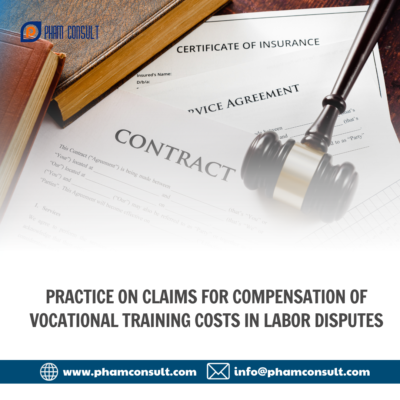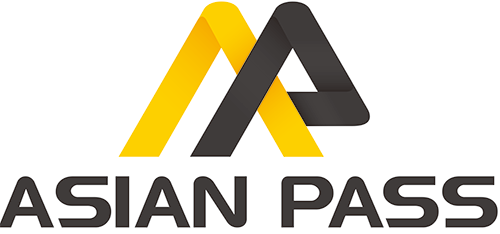Currently, there are many businesses proactively investing in training and fostering the qualifications and skills of their employees with the aim of improving the quality of production and services and increasing opportunities to expand their operations. scale of the business. However, the results of vocational training depend greatly on the commitment between the employer (“employer”) and the employee (“employee”).
Reality shows that after completing the training course, many employees do not want to continue working for the employer, which leads to the loss of investment costs and other benefits that the business should have enjoyed from the employer. workforce training. So, in this case, does the employer have the right to request the employee to compensate all vocational training costs?
In this article, PhamConsult will present some issues that employers need to pay attention to when labor disputes arise about vocational training costs with employees.

1. Agreement on vocational training between employer and employee
According to Vietnamese labor law, vocational training is understood as the case where employees are trained to improve their qualifications and vocational skills, or retrain domestically or abroad from the employer’s funds, including funds provided by the employer. Sponsoring partners for employers.
According to Clause 2, Article 62 of the 2019 Labor Code, this vocational training must be agreed upon by the employee and the employer, and made in writing in the form of a vocational training contract (“PDTN”). The employment contract must have the following main contents:
(i) vocational training;
(ii) location, time and salary during the training period;
(iii) commitment period to work after training;
(iv) training costs and responsibility to reimburse training costs;
(v) responsibilities of employers;
(vi) and responsibilities of employees
In particular, vocational training costs are an important issue in the agreement between the parties, and must be clearly and specifically stipulated in the Employment Contract to serve as a basis for requiring the employee to reimburse an amount of money when violating obligations. of this agreement.
According to Clause 3, Article 62 of the 2019 Labor Code, vocational training costs include expenses with valid documents on necessary expenses such as:
– expenses paid to instructors; learning materials, schools, classes, computers, equipment, practice materials and other costs to support learners;
– salary; social insurance premiums; Health Insurance; Unemployment insurance for students while studying
– Travel expenses and living expenses during the training period (if the employee is sent for training abroad)
2. Conditions for employers to request compensation from employees for vocational training costs. Employees incur liability to compensate employers for vocational training costs in the following cases:
Case 1: The employee terminates the labor contract (“Labor Contract”) in accordance with the law
Although the labor law does not stipulate the obligations of the employee in this case, Clause 2, Article 61 of the Law on Vocational Education 2014 stipulates that the employee, after completing the vocational training course, must work for the employer for a term. committed in the Youth Development Council; In case the employee fails to comply with this commitment, he/she must reimburse training costs.
Thus, the employee is still responsible for compensating training costs to the employer for violating the obligation regarding the working term after completing the course.
Case 2: The employee illegally terminates the labor contract
If the termination of the labor contract does not fall into the cases where the employee has the right to unilaterally terminate the labor contract according to the law, it is determined to be an illegal unilateral termination of the labor contract. According to the provisions of Article 40 of the 2019 Labor Code, Employees must perform the following obligations towards the Employer from the time the above event occurs:
– Compensate the employer for half a month’s salary under the labor contract and an amount corresponding to the salary under the labor contract for days without prior notice;
– Reimburse the employer for training costs based on the Employment Contract signed by the parties;
– Do not receive severance pay.
Employers need to note that employees are only obliged to compensate employers for all vocational training costs when violating vocational training agreements. Therefore, cases where employers require employees to pay an amount equivalent to the fine for violating contractual obligations are contrary to the provisions of labor law. If the employer wants the employee to pay him/her a sum of money in addition to compensation for vocational training costs, the parties must have an agreement on the penalty clause in the employment contract. Only then will the employer have the right to request the employee to pay a fine for failing to comply with the commitments in the Employment Contract.
3. Practical notes on proving the obligation to compensate workers for vocational training costs
When requesting a competent court to resolve a dispute over compensation for training costs when an employee fails to comply with the commitment regarding working time after completing the training course, employers should note that the agencies conducting the prosecution The court will reassess the amount of money that the employer requires the employee to reimburse.
According to our experience, determining the reasonable level of compensation must be based on the validity of the content of the vocational training agreement in the labor contract or unemployment contract or other written agreement between the employee and the employer to clarify the issues. following details:
– Is there really any training in practice that gives rise to liability for compensation of training costs for employees?
– Compensation must be based on the actual training time and the training time in the agreement; Committed time to work after training and actual working time;
– Training costs and expenditure items in agreement and in reality.
Therefore, employers should pay attention to preparing evidence consistent with the above assessment criteria to prove the employee’s responsibility to compensate for training costs and request compensation for a specific amount of money from the employer. in accordance with the agreement of the parties and the provisions of law.
Pham Consult hopes that this information will help the working process




 VI
VI